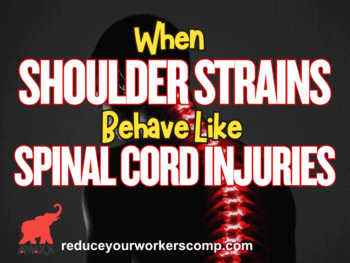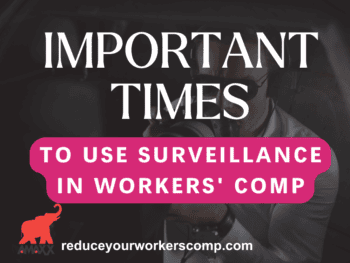EVERY CLAIM HAS A FIRST WEEK. Right!
We all know that, it is obvious. What else would you call the seven days which follow an accident? And how, barring the end of the world, would you not have a first week? But that is not the message of this piece.
The first week following an accident is a one-time period for opportunity. A diligent employer can, in those first seven days, shape the outcome of a claim so that all (in this case, the employer and employee) will benefit. The “losers” will be those who stand to gain from inefficiency, which is to say, everyone else in the claims process.
Click Link to Access Free PDF Download
“How Do I Get My Adjusters To Follow My Account Handling Instructions?”
Why is the first week so important? The law requires some things to be done rather quickly (filing an employer’s report of injury) but most can surely wait until the carrier does them – can’t they? The technical answer is, “Yes.” The smart answer is, “No!”
Every claim does have a first week- but none have two of them. Once the first week passes without action it can never be regained – and the first week is exclusively the employer’s. A carrier cannot effectively get started defending a claim until several weeks passes from when it is notified.
What should the employer do in this period? Oversee the care of the employee and gather facts. The first is not optional – at least not in NY.
Most people who work in the comp field in NY are surprised to learn that the comp law places an affirmative responsibility on the part of the EMPLOYER (no one else is mentioned) to see that an injured employee receives proper medical care. That does not mean selecting a treating doctor (although that was actually done in the first decades of the comp law), but it does mean that the employer should not be passive if the employee is obviously not getting the treatment needed.
The other responsibility which should be attended to by the employer is gathering a forwarding (to the Board, the carrier, the treating doctor and the worker) information and documents which will be needed (payroll, details of accident) or which might be needed (prior injuries, claims, employers, medical plans, periods of significant absence, etc.).
The last, documents which might be needed, puzzles many employers. If the information is not requested, why would it ever be needed? The answer is that if others do not know the information exists – why would they request it? True, they should ask what other information exists – but in the real world they usually do not. Nothing will increase an x-mod faster than the useful information which remains silent and uninvited, sitting in a file cabinet drawer (or in cyberspace).
Finally, there is the therapeutic aspect of purposeful activity. A worker, and the worker’s family, is all too frequently struggling through a morass of silence and indifference during the first weeks. The person closest to them, the employer, seems to be uninvolved in the claim. Many employers are under the impression that they are REQUIRED to be out of the loop. “The carrier has to do that.” In truth, the comp law mentions the employer frequently and the carrier hardly at all – except as surety for payment of awards. [WCx]
In short, it is difficult for an employer to be over involved in a claim. Or over concerned about the welfare of an employee. And the best time to become involved and concerned is – the first week.
Author: Attorney Theodore Ronca is a practicing lawyer from Aquebogue, NY. He is a frequent writer and speaker, and has represented employers in the areas of workers’ compensation, Social Security disability, employee disability plans and subrogation for over 30 years. Attorney Ronca can be reached at 631-722-2100. medsearch7@optonline.net
WORKERS COMP MANAGEMENT MANUAL: www.WCManual.com
MODIFIED DUTY CALCULATOR: www.LowerWC.com/transitional-duty-cost-calculator.php
Do not use this information without independent verification. All state laws vary. You should consult with your insurance broker or agent about workers comp issues.
©2012 Amaxx Risk Solutions, Inc. All rights reserved under International Copyright Law. If you would like permission to reprint this material, contact us at: Info@ReduceYourWorkersComp.com.















